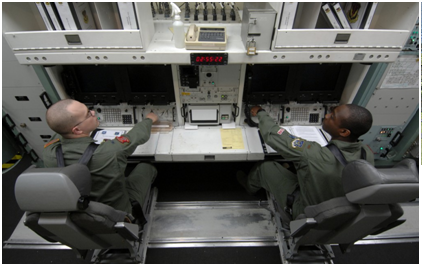I have posted several times about the problems in the U.S. nuclear missile forces. The U.S. missile force is responsible for the maintenance and launch of four hundred and fifty intercontinental missiles based in North Dakota, Montana, and Wyoming. Generals have been fired for misbehavior, launch officers cannot pass certification exams, facilities are deteriorating, soldiers have been arrested for drug offenses and, in general, morale is at an all time low. The decrepit Minuteman 3 missile force is viewed by airmen as an unattractive posting and a career dead end. Hearings have been held and studies have been conducted to find causes and solutions. I thought it was time for an update on the situation.
There have been complaints about the Air Force nuclear missile management for years. A 2012 review of corrective attempts since 2008 concluded that the actions were "movement without direction." The study said that unless the Air Force improves its ability to develop, sustain and value nuclear expertise, the nuclear missile force will continue to decline as they have for the past two decades.
In light of all the problems and recent bad publicity, Defense Secretary Chuck Hagel has demanded swift and comprehensive action to restore public confidence in the nuclear force. Air Force leaders have come up with a number of corrective actions. Cash bonuses will be offered to officers and gaps in the ranks will be filled. A new nuclear service medal will be created. Money will be allocated to repair and modernized missile launch facilities. Air Force Secretary Deborah Lee James, who just took her post in December, will be in charge of the new effort to resolve the missile force problems. Although these changes will have some impact, critics are not sure that their impact will significantly address the root problem.
Some analysts say that the basic problem with the missile force is related to the end of the Cold War two decades ago. As the focus of the military turned to the war on terror, the old model of a conflict between two nuclear armed superpowers has faded in importance. In addition, if the launch officers are called on to launch their missiles, they will just be insuring the complete collapse of human civilization. That has got to have an impact on morale.
At first, Air Force officials took the common position that everything was OK and that the problems were just the usual griping and minor mistakes. After James was appointed as Air Force Secretary, she began a series of visits to all three missile bases and concluded that far from being routine, the problems were systemic. While the announced changes may be moves in the right direction, Hagel is still waiting for the completion of two reviews that began in February. It will be interesting to see how well the changes in progress match the recommendations of the reviews when they are complete. James has called for elevating the command of the missile force from a three star general to a four star general. This would raise the importance of the missile forcers in the overall Air Force command structure.
Launch officers at North Dakota missile base:
